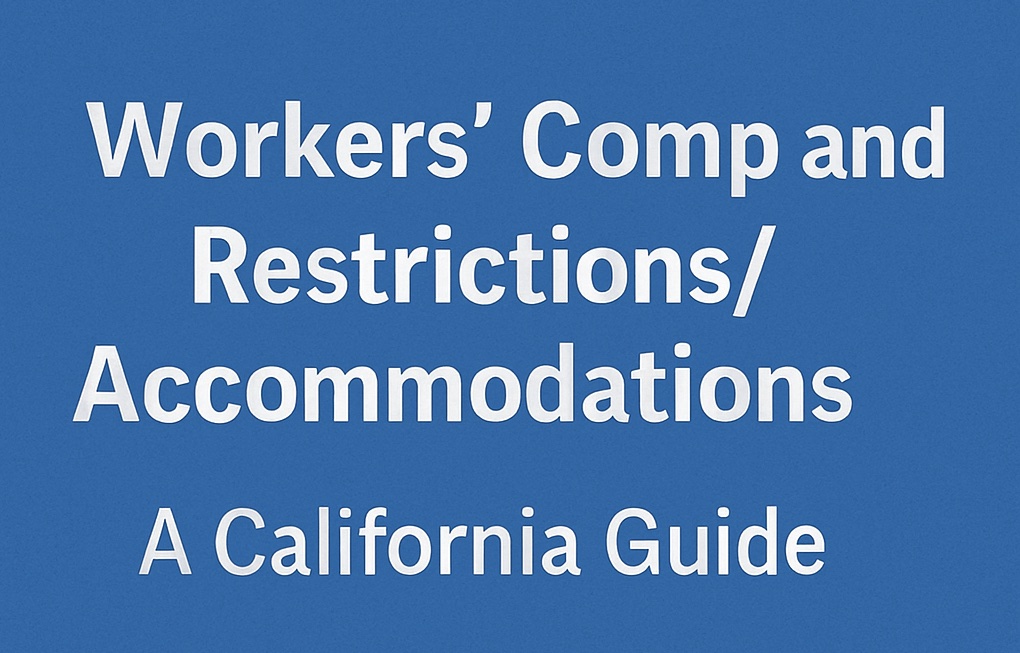
When you’re injured on the job, returning to work can be tricky. You may not be ready to resume your full duties, and your doctor may place you on temporary or permanent work restrictions. California law requires employers to offer reasonable accommodations whenever possible—but many injured workers are left in the dark or pressured to return to jobs they can’t safely perform.
At Employees First Labor Law, we help workers protect their rights while recovering from work-related injuries. Here’s what you need to know about restrictions, accommodations, and your return-to-work rights under California workers’ comp law.
What Are Work Restrictions?
Work restrictions are medical limitations placed on your physical activity by a treating physician or Qualified Medical Evaluator (QME). These restrictions are meant to protect you from re-injury or worsening your condition while you heal.
Common Work Restrictions After a Job Injury
Doctors may limit your work activity to prevent reinjury. Here are some of the most frequent restrictions:
- No lifting over a set weight (e.g., 10–20 lbs) – Common for back, arm, or shoulder injuries.
- No prolonged standing or walking – Often ordered for foot, knee, or hip injuries.
- Limited use of hands, arms, or shoulders – Applies to repetitive motion injuries or post-surgery recovery.
- No bending, squatting, or kneeling – Typical with lower back or joint injuries.
- Reduced hours or part-time schedules – Helps prevent fatigue or flare-ups during healing.
- Limitations on pushing or pulling – Prevents strain from moving heavy carts, tools, or equipment.
These restrictions must be respected by your employer. If they ignore them or try to push you back to full duty, you may have grounds for further legal action.
These restrictions are typically documented in a Doctor’s First Report of Injury or Primary Treating Physician’s PR-2 Report.
Does My Employer Have to Accommodate My Restrictions?
Yes—California Labor Code § 4600 requires employers to provide modified or alternative work if available. They must engage in the interactive process to determine whether they can accommodate your medical restrictions.
Your employer must:
- Review your doctor’s report
- Meet with you to discuss what duties you can or cannot perform
- Offer modified work within your restrictions, if feasible
If they cannot accommodate you, you may continue receiving Temporary Disability (TD) benefits or Supplemental Job Displacement Benefits (SJDB) in some cases.
🔗 Temporary Disability Benefits: What You Need to Know
Common Employer Violations
Unfortunately, many employers violate these rules, either knowingly or due to lack of training. Red flags include:
- Pressuring you to return to full duty despite restrictions
- Ignoring or disputing your doctor’s orders
- Claiming no modified work exists when it does
- Retaliating against you for requesting accommodations
- Terminating you instead of engaging in the interactive process
If your employer fails to comply, you may have additional claims under California’s Fair Employment and Housing Act (FEHA) or for wrongful termination.
🔗 Retaliation and Termination for Work Injuries
What If I Can’t Return to Any Work?
If your injuries are so severe that you can’t return to any type of employment—even with accommodations—you may be considered permanently totally disabled (PTD) or entitled to a life pension. You may also qualify for vocational retraining under California’s Return-to-Work Supplement Program or Voucher Program.
🔗 Can I Choose My Own Doctor in a Workers’ Comp Case?
How EFLL Helps Injured Workers Stay Protected
We work with injured workers across California to ensure:
- Their restrictions are respected
- Employers engage in the interactive process
- Modified duty is appropriate and safe
- TD benefits are paid when accommodation is not possible
- Wrongful terminations or retaliation are fully pursued
If you’re stuck between a doctor’s note and a stubborn employer, don’t wait. We’ll help you stand your ground, protect your health, and assert your rights under California law.
Let’s Talk About Your Rights
You don’t have to return to unsafe work. You don’t have to accept less than you deserve. Contact Employees First Labor Law today for a free consultation.
📞 Call now to schedule a free consultation.
📩 Submit Your Case Confidentially



